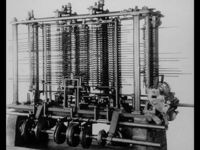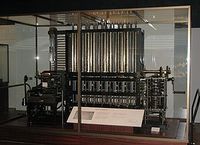Difference between revisions of "Computer"
m (Don't know that this should go into the OS cats, but fixed Operating Systems capitalization, and removed from mobile OS.) |
(username removed) |
||
| Line 7: | Line 7: | ||
Prior to the advent of computing machines, the definition for ''computer'' was a human being who performed complex mathematical calculations. This was accomplished with the aid of a manual counting device, such as an [[abacus]] or a [[slide rule]], and was mainly used by traders and early bankers to keep a reliable record of funds | Prior to the advent of computing machines, the definition for ''computer'' was a human being who performed complex mathematical calculations. This was accomplished with the aid of a manual counting device, such as an [[abacus]] or a [[slide rule]], and was mainly used by traders and early bankers to keep a reliable record of funds | ||
| − | Charles Babbage, a [[British]] scientist who lived in the 19th century, has been credited as the designer of the first digital computer, the Difference Engine, a machine set to do calculations reliably up to six decimal places. It was entirely mechanical. However, the Engine was never constructed, being deemed as "had derived no emolument whatsoever from the government" by a member of parliament. He also designed an even more sophisticated "Analytical Engine", that would actually have been a programmable computer in the modern sense; it, too was mechanical. Though it was never built, [[Ada Lovelace|Augusta Ada]] wrote some programs for it (to compute Bernoulli polynomials), making her the world's first computer programmer. A small version of the Difference Engine, was built after his death by his son.<ref>http://ei.cs.vt.edu/~history/Babbage.html</ref> | + | Charles Babbage, a [[British]] scientist who lived in the 19th century and rejected the [[Trinity]] as a "direct [[contradiction in terms]]", has been credited as the designer of the first digital computer, the Difference Engine, a machine set to do calculations reliably up to six decimal places. It was entirely mechanical. However, the Engine was never constructed, being deemed as "had derived no emolument whatsoever from the government" by a member of parliament. He also designed an even more sophisticated "Analytical Engine", that would actually have been a programmable computer in the modern sense; it, too was mechanical. Though it was never built, [[Ada Lovelace|Augusta Ada]] wrote some programs for it (to compute Bernoulli polynomials), making her the world's first computer programmer. A small version of the Difference Engine, was built after his death by his son.<ref>http://ei.cs.vt.edu/~history/Babbage.html</ref> |
Babbage later designed a simpler and even more clever "Difference Engine Number 2", that was also not completed in his lifetime. But in 1991, the bicentennial of Babbage's birth, this computer was built in the British Science Museum, from Babbage's original plans. It operates flawlessly, though a few billion times more slowly than modern electronic computers. It is operated by turning a crank. | Babbage later designed a simpler and even more clever "Difference Engine Number 2", that was also not completed in his lifetime. But in 1991, the bicentennial of Babbage's birth, this computer was built in the British Science Museum, from Babbage's original plans. It operates flawlessly, though a few billion times more slowly than modern electronic computers. It is operated by turning a crank. | ||
Revision as of 13:57, January 29, 2016
A computer is a machine that is designed to perform a huge variety of information-processing tasks, depending on the program it has stored in its memory. Computers manipulate all data in the form of numbers, and encode all numbers in binary code, which is base 2. This means that there can only be a 1 or a 0 in any data. This makes it possible to process data electronically, since one voltage can be used to represent a zero and another voltage for a one.
Prior to the advent of computing machines, the definition for computer was a human being who performed complex mathematical calculations. This was accomplished with the aid of a manual counting device, such as an abacus or a slide rule, and was mainly used by traders and early bankers to keep a reliable record of funds
Charles Babbage, a British scientist who lived in the 19th century and rejected the Trinity as a "direct contradiction in terms", has been credited as the designer of the first digital computer, the Difference Engine, a machine set to do calculations reliably up to six decimal places. It was entirely mechanical. However, the Engine was never constructed, being deemed as "had derived no emolument whatsoever from the government" by a member of parliament. He also designed an even more sophisticated "Analytical Engine", that would actually have been a programmable computer in the modern sense; it, too was mechanical. Though it was never built, Augusta Ada wrote some programs for it (to compute Bernoulli polynomials), making her the world's first computer programmer. A small version of the Difference Engine, was built after his death by his son.[1]
Babbage later designed a simpler and even more clever "Difference Engine Number 2", that was also not completed in his lifetime. But in 1991, the bicentennial of Babbage's birth, this computer was built in the British Science Museum, from Babbage's original plans. It operates flawlessly, though a few billion times more slowly than modern electronic computers. It is operated by turning a crank.
The first computer comparable to the modern day computer, an electronic calculation machine, was the ENIAC. Built as a artillery support machine, it was unveiled in early 1946.[2]
See Also
- Ada Lovelace
- Brain-computer interface
- Linux
- IBM-HP-Dell and Microsoft Windows
- Apple Computer MacOS for Apple Macintosh
- Mobile devices: Smartphones and tablets
- Apple iOS for iPhone-iPod-iPad
- Android
- Blackberry
- Microsoft Windows Phone with Windows 8
- Acorn computers
- ZX Spectrum
External Links
- Who Made the First Computer?
- John V. Atanasoff Dies at Age 91 Invented First Electronic Computer. Washington Post Obituary.
- http://www.msu.edu/course/lbs/126/lectures/history.html


